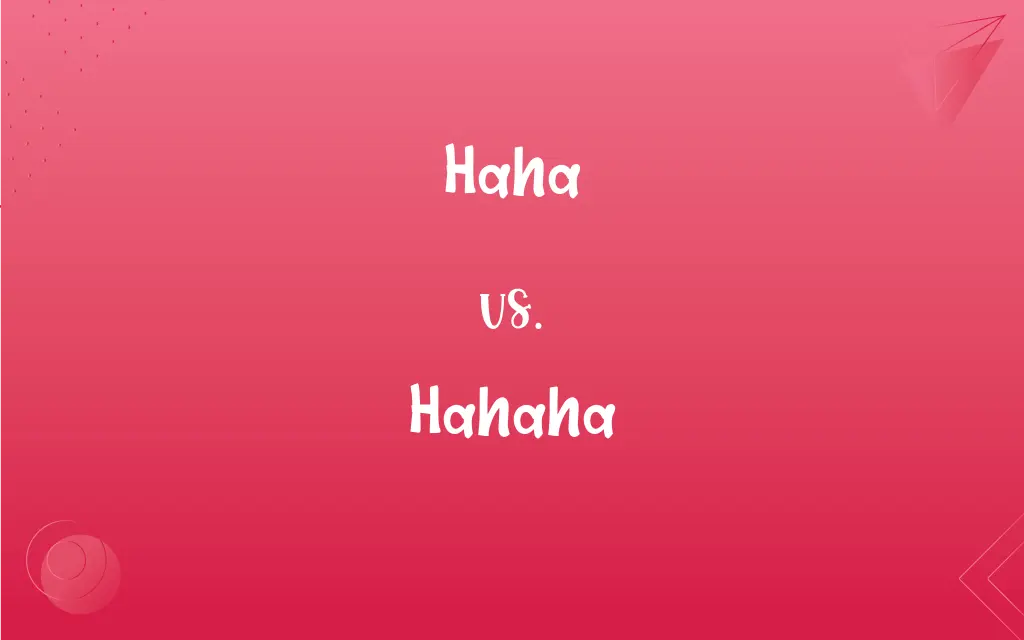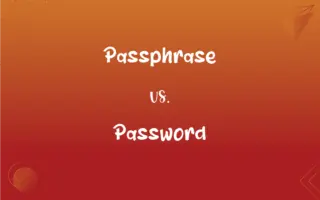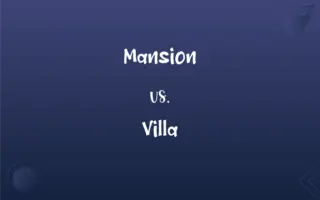Haha vs. Hahaha: What's the Difference?
By Aimie Carlson & Harlon Moss || Updated on May 21, 2024
"Haha" is typically used to indicate mild amusement or politeness, while "hahaha" suggests a stronger, more genuine laugh.

Key Differences
"Haha" often serves as a polite or minimal acknowledgment of humor, signaling a mild reaction. It is commonly used in text conversations to show that something is funny, but not necessarily hilarious. For example, someone might respond with "haha" to a joke that is amusing but not laugh-out-loud funny. "Hahaha," on the other hand, expresses a more genuine and hearty laughter. It conveys that something is genuinely funny and elicits a stronger emotional response. This term is often used to emphasize a higher level of amusement, showing that the joke or comment truly resonated.
When comparing "haha" and "hahaha," the number of syllables plays a significant role in the intensity of the reaction. "Haha" with its two syllables, is more reserved, whereas "hahaha" with its four syllables, suggests a louder and more pronounced laugh.
In digital communication, "haha" can sometimes come off as insincere or curt, while "hahaha" usually indicates genuine enjoyment and engagement. The choice between the two can affect the perceived tone of a message, impacting how the recipient interprets the sender's emotions.
Comparison Chart
Syllables
Two
Four
Intensity of Laughter
Mild
Strong
ADVERTISEMENT
Tone
Polite or minimal acknowledgment
Genuine and hearty
Usage Context
Casual, often for minor amusement
More enthusiastic, for strong humor
Perceived Sincerity
Sometimes insincere or curt
Usually genuine and engaged
Haha and Hahaha Definitions
Haha
Indicates minor amusement.
Haha, good one!
Hahaha
Indicates hearty enjoyment.
Hahaha, I can’t stop laughing!
ADVERTISEMENT
Haha
Shows light-hearted reaction.
Haha, nice try!
Hahaha
Used to express true amusement.
Hahaha, that’s so funny!
Haha
Used to acknowledge a joke.
Haha, I see what you did there.
Hahaha
An enthusiastic laugh.
Hahaha, that made my day!
Haha
Mild laugh, often polite.
That's funny, haha.
Hahaha
Genuine laughter, showing strong amusement.
That joke was hilarious, hahaha!
Haha
Minimal expression of humor.
Haha, that’s interesting.
Hahaha
Shows a strong reaction to humor.
Hahaha, you’re too much!
Haha
An onomatopoeic representation of laughter.
Hahaha
Haha (an onomatopoeic representation of laughter).
Haha
To laugh.
Haha
Type of boundary to a garden, pleasure-ground, or park, designed not to interrupt the view and to be invisible until closely approached.
FAQs
Is "hahaha" more genuine than "haha"?
Yes, "hahaha" typically indicates a stronger and more genuine laugh than "haha."
Can "haha" be seen as insincere?
Sometimes, "haha" can come across as insincere or curt, depending on the context.
Does "haha" show strong amusement?
No, "haha" generally shows mild amusement.
What does "haha" mean?
"Haha" is a way to express mild amusement or politeness in response to something funny.
When should I use "haha"?
Use "haha" for a polite or minimal reaction to a joke or funny comment.
How many syllables are in "hahaha"?
"Hahaha" has four syllables.
Is "haha" appropriate for all situations?
"Haha" is suitable for casual and polite responses but may not convey strong amusement.
Can "haha" be used sarcastically?
Yes, "haha" can be used sarcastically to downplay humor.
How many syllables are in "haha"?
"Haha" has two syllables.
Does "hahaha" show strong amusement?
Yes, "hahaha" expresses strong amusement and genuine laughter.
Is "hahaha" appropriate for professional settings?
It depends on the context, but "hahaha" can sometimes be too informal for professional communication.
Can "hahaha" be used sarcastically?
While less common, "hahaha" can be used sarcastically to exaggerate laughter.
Does "hahaha" convey the same meaning in different cultures?
"Hahaha" is widely understood as strong laughter across cultures.
Can "hahaha" be used in formal writing?
"Hahaha" is generally not suitable for formal writing due to its casual tone.
Is "haha" common in text messages?
Yes, "haha" is commonly used in text messages to show minor amusement.
Does "haha" convey the same meaning in different cultures?
The meaning of "haha" can vary slightly across cultures, but it generally signifies mild laughter.
Which shows more engagement, "haha" or "hahaha"?
"Hahaha" shows more engagement and stronger emotional response than "haha."
Is "hahaha" common in text messages?
Yes, "hahaha" is frequently used to express hearty laughter in text messages.
Can "haha" be used in formal writing?
"Haha" is typically avoided in formal writing as it is informal.
Can "haha" and "hahaha" be used interchangeably?
They can be used interchangeably in some contexts, but they convey different levels of amusement.
About Author
Written by
Aimie CarlsonAimie Carlson, holding a master's degree in English literature, is a fervent English language enthusiast. She lends her writing talents to Difference Wiki, a prominent website that specializes in comparisons, offering readers insightful analyses that both captivate and inform.
Co-written by
Harlon MossHarlon is a seasoned quality moderator and accomplished content writer for Difference Wiki. An alumnus of the prestigious University of California, he earned his degree in Computer Science. Leveraging his academic background, Harlon brings a meticulous and informed perspective to his work, ensuring content accuracy and excellence.































































